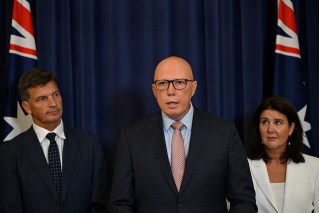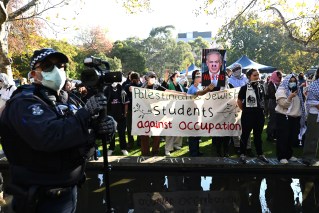Billions of dollars down the drain: Political ads are not persuasive, US study finds

In 2010, the US Supreme Court ruled that corporations and other outside groups can spend unlimited cash on elections.
Critics of the ruling said this would allow rich organisations to have outsized influence at the polls, and with their man in Washington, by way of huge donations.
In August, Joe Biden’s presidential campaign brought in more than US$300 million, breaking the record for money raised in a single month. Most of that money reportedly came in small bills, from mum and dad donors.
Wherever the money comes from, spending obscene amounts on political ads is obviously seen as worth it. But is it?
Short answer: in a tight race, maybe
Why? A new study from Yale political scientist Alexander Coppock finds that “regardless of content, context, or audience, those pricey commercials do little to persuade voters.”

Advertising that speaks to a hot issue is likely preaching to the converted. Photo: Getty
In a prepared statement, Dr Coppock, an assistant professor of political science in the Faculty of Arts and Sciences, said:
“There’s an idea that a really good ad, or one delivered in just the right context to a targeted audience, can influence voters, but we found that political ads have consistently small persuasive effects across a range of characteristics.”
Political parties are already aware of this, no doubt. But they also understand that if a tiny number of people are in fact persuaded, and the race is super-tight, on a large scale the money just might get one candidate across the line.
Hence, money more than message can matter. Or not.
How did the researchers get their result
According to a statement from Yale:
- The study measured the persuasive effects of 49 high-profile advertisements during the 2016 Trump/Clinton presidential campaign, via a series of 59 randomised experiments.
- Over 29 weeks, a nationally representative sample of 34,000 Americans was divided at random into groups and assigned to watch campaign advertisements or a placebo advertisement (a car-insurance commercial) before answering a short survey.
- The researchers selected ads “using real-time, ad-buy data and news coverage of each week’s most important ads.”
- They tested ads attacking or promoting Republican candidate Donald Trump and Democratic candidate Hillary Clinton as well as commercials concerning primary candidates, such as Republican Ted Cruz and Democrat Bernie Sanders.
- They analysed the ads’ effects on survey respondents across several variables, including the candidate, party, or political action committee that sponsored them; whether they were positive or negative in tone; the partisanship of those viewing the ads; the time to Election Day when they aired; whether they were viewed in a battleground state or not; and whether they aired during the primary or general election.
The findings were pretty conclusive
The researchers found that, on average and across all variables, “the ads moved a candidate’s favourability rating respondents only .05 of a point on the survey’s five-point scale, which is small but statistically significant given the study’s large size.”
The ads’ effect on whom individuals intended to vote for was smaller still – a statistically insignificant 0.007 of a percentage point.

A billboard mocking President Trump, paid for by billionaire Mike Bloomberg. Photo: Getty
Expanding on prior research suggesting that political ads have little impact on voters’ preferences, the study shows that those weak effects are consistent irrespective of a number of factors, including an ad’s tone, timing, and its audience’s partisanship.
“Positive ads work no better than attack ads. Republicans, Democrats, and independents respond to ads similarly. Ads aired in battleground states aren’t substantially more effective than those broadcast in non-swing states,” said Dr Coppock.
The researcher conceded that the findings “do not demonstrate that political advertising is always ineffective … noting that the study didn’t analyze the influence of an entire advertising campaign.”
Dr Coppock said that TV ads at least helped candidates increase their name recognition.
“Moreover, the effects we demonstrated were small but detectable and could make the difference between winning and losing a close election,” he said.
Previous studies have suggested that TV ads might be more effective when we’re multitasking, and therefore not giving them our full attention; that voters might be swayed more by candidates who share their looks; and that voters physically recoil from negative ads.








